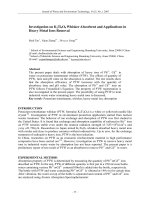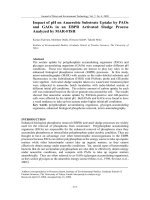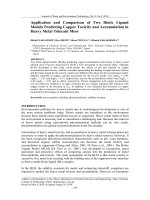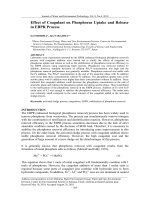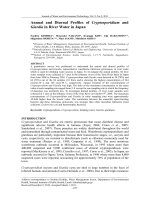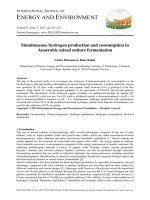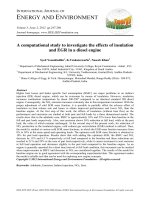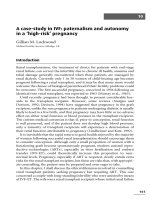- Trang chủ >>
- Khoa Học Tự Nhiên >>
- Vật lý
agency and autonomy in kants moral theory selected essays apr 2006
Bạn đang xem bản rút gọn của tài liệu. Xem và tải ngay bản đầy đủ của tài liệu tại đây (1.44 MB, 290 trang )
AGENCY AND AUTONOMY IN
KANT’S MORAL THEORY
This page intentionally left blank
Agency and Autonomy
in Kant’s
Moral Theory
ANDREWS REATH
CLARENDON PRESS
●
OXFORD
1
Great Clarendon Street, Oxford OX2 6DP
Oxford University Press is a department of the University of Oxford.
It furthers the University’s objective of excellence in research, scholarship,
and education by publishing worldwide in
Oxford New York
Auckland Cape Town Dar es Salaam Hong Kong Karachi
Kuala Lumpur Madrid Melbourne Mexico City Nairobi
New Delhi Shanghai Taipei Toronto
With offices in
Argentina Austria Brazil Chile Czech Republic France Greece
Guatemala Hungary Italy Japan Poland Portugal Singapore
South Korea Switzerland Thailand Turkey Ukraine Vietnam
Oxford is a registered trade mark of Oxford University Press
in the UK and in certain other countries
Published in the United States
by Oxford University Press Inc., New York
© Andrews Reath 2006
The moral rights of the author have been asserted
Database right Oxford University Press (maker)
First published 2006
All rights reserved. No part of this publication may be reproduced,
stored in a retrieval system, or transmitted, in any form or by any means,
without the prior permission in writing of Oxford University Press,
or as expressly permitted by law, or under terms agreed with the appropriate
reprographics rights organization. Enquiries concerning reproduction
outside the scope of the above should be sent to the Rights Department,
Oxford University Press, at the address above
You must not circulate this book in any other binding or cover
and you must impose the same condition on any acquirer
British Library Cataloguing in Publication Data
Data available
Library of Congress Cataloging in Publication Data
Reath, Andrews.
Agency and autonomy in Kant’s moral theory / Andrews Reath.
p. cm.
Includes bibliographical references and index.
1. Kant, Immanuel, 1724–1804. 2. Act (Philosophy) 3. Agent (Philosophy)
4. Autonomy (Philosophy) I. Title.
B2799.A28R43 2006 170.92—dc22 2005026642
Typeset by Newgen Imaging Systems (P) Ltd., Chennai, India
Printed in Great Britain
on acid-free paper by
Biddles Ltd., King’s Lynn, Norfolk
ISBN 0–19–928882–8 978–0–19–928882–3
ISBN 0–19–928883–6 (Pbk.) 978–0–19–928883–0
13579108642
For Blandine
Preface
I was lucky to have become interested in Kant’s moral philosophy at a time
when work on this area of his thought had begun to flourish, following the lead of
several talented philosophers who, because they grasped the complexity and depth
of Kant’s moral thought, understood what a powerful approach to moral theory
it provided. I have learned from many people, both from their written work and in
conversation. I would especially like to thank Henry Allison, Steve Engstrom,
Hannah Ginsborg, Barbara Herman, Tom Hill, Pierre Keller, Chris Korsgaard,
and Onora O’Neill. To John Rawls, with whom I had the very great fortune to
study, I owe a different kind of debt that is described in the last note of Chapter 6.
Some of these essays were written with the support of the National Endowment
for the Humanities and the National Humanities Center, both of which I thank.
Finally, I am grateful to my wife, Blandine Saint-Oyant, for putting up with me
while I wrote the individual essays and completed the volume, which in each case
took too long. She provided the cover art, and this book is dedicated to her.
Contents
Translations and Abbreviations viii
Sources x
Introduction 1
1. Kant’s Theory of Moral Sensibility: Respect for the Moral Law
and the Influence of Inclination 8
2. Hedonism, Heteronomy, and Kant’s Principle of Happiness 33
3. The Categorical Imperative and Kant’s Conception of
Practical Rationality 67
4. Legislating the Moral Law 92
5. Autonomy of the Will as the Foundation of Morality 121
6. Legislating for a Realm of Ends: The Social Dimension
of Autonomy 173
7. Agency and Universal Law 196
8. Self-Legislation and Duties to Oneself 231
9. Agency and the Imputation of Consequences in Kant’s Ethics 250
Bibliography 270
Index 275
Index of passages 279
Translations and Abbreviations
Translations
Citations of Kant’s works are to the volume and page number in the Royal Prussian
Academy of Sciences edition of Immanuel Kant, Gesammelte Schriften (Berlin: Walter de
Gruyter, 1902–), except for references to the Critique of Pure Reason. The latter cite the
page number of the B Edition. I use the following abbreviations and translations:
G Groundwork of the Metaphysics of Morals, tr. Mary J. Gregor, in Immanuel
Kant, Practical Philosophy (New York: Cambridge University Press, 1996).
KpV Critique of Practical Reason, tr. Mary J. Gregor, in Immanuel Kant, Practical
Philosophy (New York: Cambridge University Press, 1996).
KrV Critique of Pure Reason, tr. Paul Guyer and Allen W. Wood (New York:
Cambridge University Press, 1998).
KU Critique of Judgment, tr. Paul Guyer and Eric Matthews (New York:
Cambridge University Press, 2000).
MdS The Metaphysics of Morals, tr. Mary J. Gregor, in Immanuel Kant, Practical
Philosophy (New York: Cambridge University Press, 1996).
MP-C Moral Philosophy: Collins, tr. Peter Heath, in Immanuel Kant, Lectures on Ethics,
ed. Peter Heath and J. B. Schneewind (New York: Cambridge University Press,
1997).
Rel Religion within the Boundaries of Mere Reason, tr. George di Giovanni, in
Immanuel Kant, Religion and Rational Theology, ed. Allen Wood and George
di Giovanni (New York: Cambridge University Press, 1996).
VRL ‘On a Supposed Right to Lie from Philanthropy’, tr. Mary J. Gregor, in
Immanuel Kant, Practical Philosophy (New York: Cambridge University Press,
1996).
Other works of Kant cited are:
‘Conjectural Beginning of Human History’, in On History, ed. Lewis White Beck
(Indianapolis: Bobbs-Merrill, 1975).
‘An Answer to the Question: What is Enlightenment?’ and ‘What is Orientation in
Thinking?’ tr. H. B. Nisbet, in Kant: Political Writings, ed. Hans Reiss (New York:
Cambridge University Press, 1991).
Abbreviations
I use the following (now standard) abbreviations to refer to the different formulae of the
Categorical Imperative:
FUL The Formula of Universal Law, first introduced at G 4: 421—‘act only in
accordance with that maxim through which you can at the same time will that it
become a universal law’.
FLN The Formula of the Law of Nature, first introduced at G 4: 421—‘act as if the
maxim of your action were to become by your will a universal law of nature’.
FH The Formula of Humanity, first introduced at G 4: 429—‘so act that you use
humanity, whether in your own person or in the person of another, always at the
same time as an end, never merely as a means’.
FA The Formula of Autonomy, first introduced (in truncated form) at G 4: 431—
‘the idea of the will of every rational being as a will giving universal law’.
FRE The Formula of the Realm of Ends, first introduced at G 4: 436—‘all maxims
from one’s own law-giving are to harmonize with a possible kingdom of ends as
with a kingdom of nature’.
I treat the FLN as a variant of the FUL, and the FRE as a more complete statement of
the idea expressed by the FA. For the most part I am concerned in these essays with the
FUL, the FA, and the connections between them. In Chapter 5 I argue that Kant regards
the FUL and the FA as strictly equivalent, since he thinks that both can be derived from
the concept of a practical law.
Translations and Abbreviations
ix
Sources
I am grateful to the original publishers for permission to reprint the following essays:
‘Kant’s Theory of Moral Sensibility’, Kant-Studien, 80/3 (1989), 284–302. Reprinted with
permission of the publisher.
‘Hedonism, Heteronomy, and Kant’s Principle of Happiness’, Pacific Philosophical
Quarterly, 70/1 (1989), 42–72. © University of Southern California 1989. Reprinted with
permission.
‘The Categorical Imperative and Kant’s Conception of Practical Rationality’, The Monist,
72/3 (1989), 384–410. Copyright © 1989, THE MONIST: An International Quarterly
Journal of General Philosophical Inquiry, Peru, Illinois 61354, USA. Reprinted with
permission.
‘Legislating the Moral Law’, Nous, 28/4 (1994), 436–64. Reprinted with permission of
the publisher.
‘Legislating for a Realm of Ends: The Social Dimension of Autonomy’, in Andrews Reath,
Barbara Herman, and Christine M. Korsgaard, eds., Reclaiming the History of Ethics:
Essays for John Rawls (New York: Cambridge University Press, 1997), 214–39. Reprinted
by permission of Cambridge University Press.
‘Duties to Oneself and Self-Legislation’, in Mark Timmons, ed., Kant’s Metaphysics of
Morals: Interpretive Essays (Oxford: Oxford University Press, 2001), 349–70. Reprinted by
permission of Oxford University Press.
‘Agency and the Imputation of Consequences in Kant’s Ethics’, Jahrbuch für Recht
und Ethik 2 (1994), 259–82. Reprinted with permission of the publisher.
Introduction
The essays in this collection are attempts to understand various features of Kant’s
moral psychology, his conception of rational agency, his conception of autonomy,
and related areas of his moral theory. They were written over a period of years as
independent essays, but there are connections between them and the topics that
they address. Certain of the essays led to others, or draw on an idea developed else-
where. Several of the essays circle around a common set of themes and explore
them from differing angles. Almost all the essays are driven initially by some point
of interpretation—a question raised by a remark that is puzzling, unclear, or
troubling in some other way, or by an obscure transition in a text—mainly in the
Groundwork and the Critique of Practical Reason. I try to come to terms with
the interpretive question by reconstructing a philosophical conception or an argu-
ment that can be seen to underlie what Kant says, and that explains it in a satisfac-
tory way. For the most part I do not ask whether the views that I ascribe to Kant,
or to which I claim that he is committed, are true, though I devote effort to read-
ing views into the texts that are plausible and worth taking seriously. Not much is
gained by saddling a great philosopher with a philosophical view that has little to
recommend it.
The first three chapters take up issues that arise in connection with Kant’s
moral psychology and his conception of rational agency. Chapter 1, ‘Kant’s
Theory of Moral Sensibility’, and Chapter 2, ‘Hedonism, Heteronomy, and
Kant’s Principle of Happiness’, develop an interpretation of Kant’s understanding
of motivation and choice. Chapter 3, ‘The Categorical Imperative and Kant’s
Conception of Practical Rationality’, shifts the focus to his conception of practical
rationality and its role in his derivation of the universal law formulation of the
Categorical Imperative. One common theme, developed in the first essay, is the
claim that Kant thought that all rational choice is guided by considerations that
an agent regards as good and sufficient reasons for action. That is, I suggest that
for Kant it is a constitutive feature of free, rational choice that it is guided by
considerations that an agent takes to have normative force for others, as well as
himself, and that an incentive motivates through the judgment that it provides
a sufficient reason for action.
‘Kant’s Theory of Moral Sensibility’ analyzes Kant’s account of respect for
morality as the distinctive form of moral motivation in the Critique of Practical
Reason (‘The Analytic of Pure Practical Reason’, Chapter III), and uses his account
of respect as a way into his general conception of rational motivation and choice.
Kant refers to respect both as the immediate recognition of the authority of the
moral law and as a distinctive moral feeling. I try to show how these are connected
aspects of a single phenomenon. Properly speaking, what motivates is the recognition
of the authority of the moral law; the feeling of respect—its affective dimension—
is the way in which we experience the authority and motivating influence of moral
considerations. In order to understand how respect for morality counteracts the
influence of inclination and non-moral interests, as Kant thinks that it can, one
needs an appropriate understanding of the motivating influence of the latter.
I argue that since moral considerations motivate through an agent’s recognition of
their authority, non-moral desires likewise get their purchase on the will when an
agent takes them to provide sufficient reasons for action. Their motivational
influence can then be undercut when moral scrutiny shows that these reasons are
insufficient and that their claims to validity do not stand up.
‘Hedonism, Heteronomy, and Kant’s Principle of Happiness’ extends this
account of motivation to argue that Kant did not accept a crude hedonistic
picture of non-moral motivation, as is widely assumed. In the Critique of Practical
Reason, Kant claims that non-moral choices are all of a kind because they make
‘pleasure in the reality of an object’ or expected ‘feelings of agreeableness’ the
‘determining ground of choice’ (KpV 5: 21–2). The standard interpretation of
these passages has Kant saying that all non-moral choice is motivated by the desire
for pleasure as its end. Kant’s critics have often taken him to task for holding this
view, arguing that central elements of his moral theory are undermined because
they presuppose a crude and mistaken conception of non-moral motivation.
But read in light of a proper understanding of Kant’s conception of action, the
‘determining ground of choice’ is the principle on which the agent acts, not
the end at which the action is directed. Thus Kant’s point is that non-moral choice
takes expected satisfaction or strength of desire as a sufficient reason for adopting
an action or an end. What unifies non-moral choices is not a common end of
pleasure, but rather a shared structural feature that is consistent with their being
directed at the normal range of different ends. My larger point in this essay is that
the real import of what Kant terms the ‘principle of happiness’ is that it
represents the shared structure or common form of non-moral choice, which can
be contrasted with the form of moral choice (as represented by the Categorical
Imperative). The hedonistic reading of Kant’s conception of non-moral
motivation misunderstands the significance of this principle.
These two essays try to preserve Kant from a simple dualistic picture of
motivation that, according to many critics, deforms his moral psychology. On the
interpretation that I support, his conceptions of motivation and choice remain
dualistic, since the principles of happiness and morality represent fundamentally
different forms of choice. But moral and non-moral considerations motivate in
essentially the same way, through an agent’s judging that an incentive provides
a good reason and freely adopting it into a maxim of action. Chapter 3 further
develops this normative conception of choice as based on reasons whose normative
force extends to the point of view of others. This essay shows how this conception
of rational choice figures in Kant’s attempt to derive a statement of the Categorical
Introduction
2
Imperative from a conception of practical reason in the first and second sections of
the Groundwork.
Chapters 4 through 6 develop what I hope is a distinctive approach to one of the
centerpieces of Kant’s moral theory—his conception of autonomy. Kant famously
argues that a proper philosophical understanding of the conception of morality
found in ordinary thought must present the basic principle of morality as a principle
of autonomy. The special authority that moral requirements carry, according
to ordinary thought, can be explained and can be substantiated only if moral princi-
ples originate in our rational will, or to use Kant’s preferred locution, if we are, in
some sense, their legislators. The first moment, as it were, of moral experience is
subjection to duty—subjection to requirements that apply with necessity and limit
the force of reasons based in desire and subjective interest. But Kant argues that
subjection to duty presupposes, indeed is just another aspect of, the autonomy of the
will, which he characterizes as ‘the property of the will by which it is a law to itself
(independently of the property of any objects of volition)’ (G 4: 440). Kant’s
conception of autonomy has many elements and different strands. Prominent
among them is his view that the will has the power to legislate moral law, that it is
subject only to its own legislation, and that the agents who are bound by categorical
moral requirements are the legislators from whom they receive their authority.
Moral requirements are based on principles that we will for ourselves.
These essays articulate a reading of Kant’s conception of autonomy and address
some questions that it raises. What is the autonomy of the will? In what sense, or
senses, do rational agents legislate the moral principles to which they are subject,
or impose them through their willing? While Kant stresses that the principle of
morality is a principle of autonomy and that the autonomy of the rational will is
the ground of its dignity, at the same time he regards moral principles as objective
and universally valid principles that apply with necessity. How is the autonomy of
the moral agent consistent with subjection to universally valid moral law? One
feature of my treatment of these issues is to take seriously the political and juridical
metaphors that provide the framework underlying much of Kant’s moral theory.
The vocabulary of ‘law’, ‘legislation’ or ‘lawgiving’, and ‘subject’ versus ‘sovereign’
are prominent in Kant’s writing, especially in the Groundwork, and his account of
the authority of moral principles draws on the idea that laws get their authority
from the will of a lawgiver. ‘Autonomy’ in its origin is a political concept applied
to sovereign states with the power of self-rule. We might expect that attention to
Kant’s use of such concepts and to their inner logic will provide insights into
various elements of his moral theory and help us make headway with some of
its puzzling features. Furthermore, the power to create reasons through one’s
willing—willing laws for oneself or others, taking on obligations, assuming
commitments to a principle or to an end—seems to require a structured act of
volition. One way to make sense of that structure is to refer to a deliberative
procedure governed by a constitutive principle, and the political and juridical
spheres provide models of such procedures.
Introduction
3
In this spirit I suggest that Kant’s conception of autonomy is modeled on
a conception of sovereignty and should be understood as a kind of legislative
power. I argue that autonomy is best interpreted not primarily as a psychological
or motivational capacity, but as the rational agent’s sovereignty over himself or
herself. Roughly, in regarding moral agents as autonomous, Kant regards them as
a kind of sovereign legislator not bound to any external authority, with the power
to give law through their willing. This reading of autonomy requires a companion
interpretation of the Categorical Imperative as a formal principle that sets out
a kind of legislative procedure. I take the Formula of Universal Law to be the princi-
ple that is constitutive of autonomy in the sense that it is the principle that one
must follow in order to exercise this normative power. Here I suggest that there
are instructive parallels between the Formula of Universal Law and a political
constitution: the Formula of Universal Law sets out a legislative procedure
analogously to the way in which a constitution sets out a process through which
a legislature creates civil law. In this way the Formula of Universal Law may be
understood as a power-conferring rule that enables rational agents to create law
through their willing. That the Formula of Universal Law can be understood in
this way is one reason why it may be restated as the Formula of Autonomy. This
general understanding of autonomy provides a framework for resolving various
questions within Kant’s moral theory. For example, viewing the Formula of
Universal Law as a power-conferring rule that defines a kind of legislative
process explains how autonomy is consistent with subjection to universal law: if
autonomy is the power to give law through one’s will and the Formula of
Universal Law is the constitutive principle of this activity, then one exercises this
power by guiding one’s will by the Formula of Universal Law (i.e., by acting from
universalizable maxims). So understood, the Formula of Universal Law is not
a restriction of autonomy, since it is the principle that confers the power with
which autonomy is identified.
There is some overlap among these three essays, but they focus on different
aspects of this complex conception of autonomy. Chapter 4, ‘Legislating the
Moral Law’, spells out two distinct senses in which the rational will legislates
moral requirements, one that holds for the Categorical Imperative and a different
sense that holds for particular categorical imperatives or moral requirements. The
Formula of Universal Law is a law that Kant derives from the nature of rational
volition or rational choice. In this sense, it is a law that the rational will legislates
or gives to itself. Roughly, the will is a law to itself since the nature of rational
volition leads to a principle that governs its own exercise, namely the Categorical
Imperative. To understand the sense in which rational agents legislate particular
moral requirements, it is important to bear in mind that Kant is led to this idea by
considering how such requirements get their normative authority. Kant appears to
claim that the agents who are subject to moral law must be the ‘legislators’ from
whom these requirements receive their authority, because only then can we
explain their unconditional authority as categorical imperatives. The view that
Introduction
4
I ascribe to Kant is that the reasons to comply with moral requirements are given
simply by the reasoning that establishes them as requirements, from which it
follows that moral agents are bound to moral requirements in such a way that they
model the source of their authority. This capsule statement of my reconstruction
of Kant’s view does not convey much on its own, but I develop the idea initially in
Chapter 4, and at greater length in Chapter 5. In both I draw on the idea that the
Formula of Universal Law is a kind of legislative procedure that may be used to
generate moral principles that agents can apply to their maxims of action.
Chapter 5, ‘Autonomy of the Will as the Foundation of Morality’, was the first
of these essays to be drafted but the last to be completed. It aims to distinguish and
to explain the different elements that go into Kant’s claim at the end of the Second
Section of the Groundwork that autonomy of the will is the foundation of the
commonly accepted conception of morality (G 4: 445). In doing so it explores the
parallels between moral autonomy and sovereignty (while acknowledging that
these parallels give out at a certain point). Much of this chapter is an extended
reading of a move in the Groundwork that is arguably a turning point in the
history of modern ethics, where Kant argues that moral agents are not just subject
to moral requirements, but are subject to them in such a way that they must be
regarded as their authors, or source of their authority (G 4: 431). This claim,
which I call the ‘Sovereignty Thesis’, follows analytically from Kant’s conception
of a practical law or categorical imperative. It marks the transition from subjection
to duty to autonomy that drives the later portions of the argument of the Second
Section of the Groundwork and it is a component of the argument in the
Third Section that the moral law is the law of a free will. Kant’s argument for the
Sovereignty Thesis is obscure, but I take it to go roughly as follows. Since moral
requirements (practical laws) apply unconditionally, without reference to an
agent’s desires and subjective interests, the reasons to comply with them cannot
come from desire, but must instead be based on the rational procedure that makes
them requirements. In other words, one is bound to moral requirements by the
reasoning that makes them laws. The agent who complies with moral require-
ments as such thus goes through the same rational process as a legislator would in
willing them as law. The upshot is that moral requirements bind rational agents in
a way that collapses the distinction between subject and sovereign.
Chapter 6, ‘Legislating for a Realm of Ends’, picks up certain themes in the
previous two essays. One is the connection between autonomy and governance by
norms. I argue that the apparent tension between autonomy and subjection to
universally valid principles dissolves when we consider how autonomy depends
upon and is made possible by the capacity to reason in ways that can make
claims to universal validity. A second theme is the idea that autonomy is a power
exercised in relation to other rational agents with equal capacity to give law—in
other words that its exercise presupposes the community of rational agents that
Kant terms a ‘Realm of Ends’. This line of thought brings out a social dimension
to Kant’s conception of autonomy which I try to highlight in this essay.
Introduction
5
The idea that the agents who are subject to moral principles must be regarded
as their legislators (the Sovereignty Thesis) has implications throughout Kant’s
moral thought, two of which I explore in Chapters 7 and 8. ‘Agency and Universal
Law’ focuses on the interpretation of the Formula of Universal Law and its role in
the overall argument of the Groundwork. The main thesis is that Kant’s Formula of
Universal Law relies on a conception of autonomy to generate substantive moral
judgments—specifically that a conception of agents as having autonomy plays
a role in generating the contradictions that result from the universalization of
certain maxims, by which they are judged impermissible. I show how the Formula
of Universal Law, so understood, can give an account of prototypical violations of
duty such as deception, coercion, and violence. But, one might ask, what licenses
reading a conception of autonomy into the Formula of Universal Law? Here I
draw on the previous chapters. According to the Sovereignty Thesis, the agents
subject to moral principles must be regarded as their legislators, and thus as agents
with autonomy. But then moral principles should be understood as addressed to
and intended to govern the conduct of agents with the legislative capacities that go
into Kant’s conception of autonomy—they are laws willed by and for agents with
autonomy. Since this conception of agency is presupposed by the concept of
a moral requirement or practical law, it is implicit in the Formula of Universal Law
and should guide its application.
Chapter 8, ‘Self-Legislation and Duties to Oneself’, begins by using the
Sovereignty Thesis to fill out a missing element in Kant’s foundational remarks
about duties to oneself in the Doctrine of Virtue. It then articulates certain features
of Kant’s general model of duty that are implicit in his remarks about self-regarding
duties. The idea is that duties are generated by a form of interaction among agents
which has a structure defined by various positions that agents can occupy (such as
‘legislator’, ‘subject’, and agent to whom a duty is owed or the ‘source’ of a claim).
With this model in hand, one can see that both duties to oneself and self-legislation
are perfectly coherent notions because a single agent can occupy multiple positions
within this structure. However the model also shows that duties to oneself and self-
legislation involve different forms of self-constraint, since the ‘legislator’ and
‘source’ of a duty represent different positions within this structure.
Chapter 9, ‘Agency and the Imputation of Consequences in Kant’s Ethics’,
takes up a somewhat different topic, but in a way that is shaped by ideas in the
earlier chapters. In his infamous essay, ‘On a Supposed Right to Lie from
Philanthropy’, Kant relies on a principle of responsibility for consequences,
according to which all the consequences of an action contrary to duty may
be imputed to the agent. This principle has been given little critical attention,
perhaps because it is overshadowed by, though as troubling as, the rigoristic
position that he takes on lying. I argue here that this principle can be defended in
modified form. The basic idea is that the subject to whom an action or its
consequences are imputed is the agent on whose authority the action is under-
taken. Since an agent who violates a moral requirement acts ‘on his own authority’,
Introduction
6
the bad consequences of such an action are imputable to that agent. Even unfore-
seeable or accidental consequences of a violation of duty are fairly imputed
because, given the moral requirement, the agent had compelling reason to refrain
from the action that led to them. This essay fills out his conception of agency in
certain respects, for example by developing a normative understanding of the
relationships between agents and the consequences of their actions.
Chapters 1–4, 6, and 8–9 have been previously published. Chapters 5 and 7 are
published for the first time in this volume. I have made minor changes to all the
previously published essays—updating translations, updating footnotes, and edit-
ing the text for consistency. I have made more substantial changes to Chapters 1
and 2, including revisions to a section of each, some new endnotes, and the addi-
tion to each of an appendix. These essays have elicited some critical discussion. In
some instances I found the criticisms persuasive and have modified the essays
accordingly, while in others I have offered a brief response—mainly in notes and
the appendices. Any modifications to the original text that verge on being
substantial are flagged with an endnote.
Introduction
7
1
Kant’s Theory of Moral Sensibility:
Respect for the Moral Law and the
Influence of Inclination
This essay is concerned with two parallel topics in Kant’s moral psychology—
respect for the moral law as the motive to moral conduct and the influence of
inclinations on the will. I explain some of Kant’s views about respect for the moral
law and its role in moral motivation, and this leads to a consideration of the
sensible motives that respect for the law limits, as well as the more general
question of how Kant thinks that inclinations affect choice. It turns out that these
two topics are best understood in relation to each other. When we look at the
motives that respect for the law must oppose, certain facts emerge about how it
determines the will. By the same token, when we consider how respect limits the
influence of inclinations, we are forced to articulate a clearer picture of how
inclinations influence the will. In considering these questions together, one can
begin to outline an interpretation of Kant’s general theory of motivation and
choice which provides the common ground between sensible and rational motives
that is needed to explain how they interact. I begin in Section I with some
background, and in Section II turn to Kant’s account of respect.
I. MORALITY AS INCENTIVE
Kant’s most complete discussion of respect occurs in the third chapter of the
Critique of Practical Reason, entitled ‘On the Incentives of Pure Practical Reason’.¹
To place it in context, we should recall that a central aim of the second Critique is
to show that pure reason is practical, and that in this work Kant employs a strategy
for establishing the authority of the moral law that differs from that seen in the
Groundwork. The first two chapters of the latter simply derive a statement of the
moral law from the concept of practical reason; its validity for us is not established
until the Third Section, where Kant argues that any agent with a free will is
committed to the moral law and offers non-moral grounds for thinking that we
are free in the relevant sense. In the second Critique Kant tries to establish the
authority of the moral law by arguing directly for the claim that pure reason is
practical. If pure reason can provide a ‘ground sufficient to determine the will,
then there are practical laws’—that is, laws that have authority for us (KpV 5: 19).
This issue, in turn, is resolved through the doctrine of the Fact of Reason. Kant
holds that our ordinary moral consciousness shows us that we do recognize the
authority of the moral law and can act from its principles.² Since the moral law is
an expression of pure practical reason, this suffices to show that pure reason is
practical.
By the third chapter of the Critique, Kant has established that the moral law can
influence the will, or in his phrase, functions as an ‘incentive’ (Triebfeder). One
purpose of this chapter is to explore the effects of moral consciousness on the
faculty of desire. Here Kant outlines what might be called a theory of moral
sensibility, in that he is led to a set of topics that concern the interaction between
practical reason and our sensible nature, which marks out the experience of the
moral law peculiar to us.³ This includes, first, the account of respect both as
the moral incentive, and as the feeling that arises when the moral law checks the
inclinations. Second, there is a discussion of virtue as a condition in which one
successfully masters motives that are contrary to duty. Kant closes by considering
the elevating side to the experience of respect, which leads us to see certain elements
of our nature as worthy of esteem. The very fact that the moral law can check the
inclinations and ‘humiliate’ the pretensions of our sensible nature reveals our
responsiveness to rational principles, and independence from the natural order.
Respect points out certain of our limitations; but when we realize that this law has
its source in our own reason, it also reveals the ‘higher vocation’ which is the source
of our dignity.⁴
Since the concept of an incentive is a technical term for Kant, it deserves comment.
He defines it as ‘a subjective determining ground of the will of a being whose reason
does not by its nature necessarily conform with the objective law’ (KpV 5: 72). It is
a subjective determining ground of the will in the sense that it is the motivational
state of the subject that is operative on a particular occasion. Thus, an incentive must
be a kind of determining ground of the will, or a kind of motivation from which
human beings can act. The sense of the concept, as understood by Kant, presupposes
a contrast between different kinds of motivation that may be effective at different
times. Though incentives are ‘subjective’ in the above sense, they can include reasons
that are objectively valid: respect for the law is the operative incentive in morally
worthy conduct, and hence its ‘subjective determining ground’.⁵
II. TWO ASPECTS OF RESPECT
In a footnote to the Groundwork, Kant offers apparently different characterizations
of respect, all of which reappear in the second Critique. First, it is a ‘feeling self-
wrought by means of a rational concept’. Second, it is ‘the immediate determination
Kant’s Theory of Moral Sensibility
9
of the will by means of the law and consciousness of this [determination]’. And
third, Kant calls it ‘the representation of a worth that infringes upon my self-
love’.⁶ The second remark conveys what I shall view as the primary notion of
respect as the proper moral incentive, or form of moral motivation. Respect for
the moral law, in this sense, is the immediate recognition of its authority, or the
immediate determination of the will by the law. To be moved by, or to act out of,
respect is to recognize the moral law as a source of value, or reasons for action, that
are unconditionally valid and overriding relative to other kinds of reasons; in
particular, they limit the force of and outweigh the reasons provided by one’s
desires. Respect is the attitude that it is appropriate to have towards a law, in which
one acknowledges its authority and is motivated to act accordingly. I will refer to
this attitude as the ‘intellectual’ or ‘practical’ aspect of respect.⁷ One can also
display this attitude towards individuals. This could be in an honorific sense, as
when one respects a person’s merits or accomplishments by acknowledging the
value of what he or she has achieved. Or one can show respect for humanity in
the broadly ethical sense defined by the second formula of the Categorical
Imperative, the Formula of Humanity. Here it involves the recognition that
humanity (in oneself or in others) has an absolute value that places limits on how
it is permissibly treated.⁸ But in addition to its practical aspect, Kant also makes
it clear that respect has an ‘affective’ side: it is a feeling or emotion that is
experienced when the moral law checks the inclinations and limits their influence
on the will.⁹
Though the practical and the affective aspects of respect at first seem quite
different, Kant does not keep them apart. In fact he seems to devote effort to
showing that they are the same thing. An understanding of the phenomenon in
question requires that we first distinguish them, and then see how they are related
and why Kant thinks that they coincide in us. The existence of the affective aspect
of respect also raises special questions in the context of Kant’s theory. How can
there be a ‘moral feeling’ and what is its role in moral motivation? We will see that
it is the practical aspect that is active in motivating moral conduct, while the
affective side, or feeling of respect, is its effect on certain sensible tendencies. I will
begin by looking at what Kant says about the moral feeling of respect.
This feeling is most easily explained as the experience of constraints that the
moral law imposes on our inclinations. Thus, Kant stresses that it originates as a
‘negative effect’ of our moral consciousness. When the moral law determines the
will, it frustrates the inclinations, and ‘the negative effect on feeling is itself
feeling’ (KpV 5: 73). In short, the feeling of respect is an emotion that is the effect
of, and follows from, the determination of the will by the moral law, when the
latter limits the inclinations. Kant also tries to spell out a sense in which this
feeling is an incentive in moral conduct by showing how this originally negative
effect is at the same time a positive source of motivation. In us the inclinations
present obstacles that we must control, or overcome, when we act morally.
Respect promotes the satisfaction of our moral interests by counteracting these
Chapter 1
10
obstacles. Kant holds that it is an incentive toward good conduct in that it offsets
the influence of contrary motives, and thus moves us toward something that we
must at some level find good. This point is made in the following passage:
For whatever diminishes the hindrances to an activity is a furthering of this activity
itself Therefore, respect for the moral law must be regarded as also a positive but
indirect effect of the law on feeling insofar as the law weakens the hindering influence of
the inclinations by humiliating self-conceit, and must therefore be regarded as a subjective
ground of activity—that is, as the incentive for compliance with the law (KpV5: 79. Cf.
also 5: 75)
Some of Kant’s attempt to show how the feeling of respect is an incentive can be
somewhat misleading. Strictly speaking, it is not this feeling that weakens
the influence of inclinations. Since, as we shall see, the feeling of respect is the
experience one has when the inclinations are weakened by a superior motive, it
presupposes that the inclinations have already been weakened. This point emerges
from a clarification which Kant himself adds to his discussion of the moral
incentive. In attempting to explain how the feeling of respect is an incentive in
good conduct, he stresses that there is ‘no antecedent feeling in the subject that
would be attuned to morality’ (KpV 5: 76). In other words, Kant is careful to make
it clear that he is not adopting any sort of moral sense theory. Since his aim is to
show that the will is directly responsive to practical reason, and thus that pure
reason is practical, he must avoid a view which makes use of a natural desire, or
disposition, that moves us toward moral conduct, and provides morality with its
content. He cannot explain our ability, or interest, in acting morally as a feature of
our psychological constitution, or by introducing any motivational factor beyond
the recognition of the authority of the moral law. Such a view would in effect
grant that pure reason is not practical. Thus, respect can be neither a source of
motivation, nor a standard of moral judgment, which is independent of our
recognition of the moral law.¹⁰
Such considerations underlie the following important, if obscure, remark: ‘And
so respect for the law is not the incentive to morality; instead it is morality itself
subjectively considered as an incentive inasmuch as pure practical reason, by
rejecting all the claims of self-love in opposition with its own, supplies authority
to the law, which now alone has influence’ (KpV 5: 76). Here Kant means to
say that respect is not an incentive that exists prior to, or independently of, our
recognition of the moral law, but is simply this recognition itself as it functions as
an incentive in us.¹¹ All of this suggests that the feeling of respect is an incentive
only in an attenuated sense. It is indeed the inner state of a subject who is moved
by the moral law, but the active motivating factor is always the recognition of the
moral law. Thus the moral incentive, properly speaking, is what was distinguished
above as the practical aspect of respect. The affective aspect is the experience of
one’s natural desires being held in check by the moral consciousness, and as such,
an effect that occurs after, or in conjunction with, the determination of the will by
Kant’s Theory of Moral Sensibility
11
the moral law. At times a subject may feel as though these sensible motives are
being overpowered by a higher-order emotion, which, so to speak, clears the way
for one to act morally—so that a specifically moral emotion would be operative as
a motive force. But this is not correct, on the model Kant means to propose.
One’s inclinations are held in check simply by the recognition of the moral law
(the practical aspect of respect), and this interaction between practical reason and
sensibility gives rise to the feeling of respect (the affective aspect). The resulting
moral emotion ends up being something like the way in which we experience the
activity of pure practical reason.¹²
It turns out that there is a tight connection between these two aspects of
respect, due to certain facts about our nature, and this explains why Kant tends to
treat them as identical. Our sensible nature is a source of motives that conflict
with the moral disposition—specifically, because it includes the tendencies to give
priority to our inclinations which Kant terms self-love and self-conceit. Kant
thinks that these motives and tendencies are always present to some degree. Thus,
whenever the moral law is effective, it must overcome contrary motives that
originate in sensibility, and will thus produce some feeling. The determination of
the will by moral law will always be accompanied by an affect. Moreover, though
distinguishable, these aspects of respect need not be phenomenologically distinct,
but would be experienced together. As a result, the immediate recognition of the
moral law and the feeling that it produces represent connected aspects of what is
in us a single phenomenon.
This discussion brings out a further point of some importance: Kant does not
think that the moral law determines the will through a quasi-mechanical or
affective force.¹³ Such a view is implied by his remark that respect is not an
‘incentive to morality’, but the moral law itself regarded as an incentive. This
qualification to the account of respect is added to make it clear that moral motivation
does not require, or occur, through any feeling that exists independently of moral
consciousness. In addition, we saw that, while an affect is produced when the
moral law determines the will, it is not this affect that motivates. The picture
underlying these ideas is that, in acting from respect, the simple recognition of an
obligation determines or guides one’s choice. This is to be opposed to a model that
would understand the moral motive to operate by exerting a force on the will.¹⁴
More general grounds for this interpretation are supplied by Kant’s conception
of the freedom of the will. In the Religion Kant makes the following important
claim, which has come to be known as the Incorporation Thesis:
freedom of the power of choice has the characteristic, entirely peculiar to it, that it
cannot be determined to action through any incentive except so far as the human being has
incorporated it into his maxim (has made it a universal rule for himself, according to which
he wills to conduct himself); only in this way can an incentive, whatever it may be, coexist
with the absolute spontaneity of the power of choice (of freedom). (Rel 6: 23–4)
Kant claims here that an incentive never determines the will directly, but only
through a spontaneous judgment or choice made by the individual that can be
Chapter 1
12
expressed as the adoption of a maxim.¹⁵ This conception of free agency rules out
the idea that the choice is determined solely by the force that an incentive might
have, or that actions should be understood as resulting from the balance of forces
acting on the will. It indicates that Kant’s conception of choice should not be
understood on the analogy of a sum of vector forces (or of mechanical forces
acting on an object). Kant can allow an incentive to have an affective force of some
sort, but the role assigned to such force in motivation and the explanation of
action must be limited so as to leave room for the notion of choice. Thus, we may
think of respect for the law as one incentive in competition with others, against
which it sometimes wins out. But rather than prevailing against its competitors by
exerting the greater force on the will, its influence comes from providing (and
being taken by the agent to provide) a certain kind of reason for choice.
This is a point of interpretation, but there are deeper reasons for thinking that it
should be Kant’s view. If the moral law determines choice by exerting a force that
is stronger than the alternatives, moral conduct will result from the balance of
whatever psychological forces are acting on the will. The issue is whether this
model permits us to sustain the idea that such conduct is the outcome of volition.
To see this, we might first consider why Kant cannot turn to a moral sense theory
to explain moral motivation. If the moral motive were based on a natural desire or
disposition that could be directed and refined in various ways, moral conduct
would be the result of different drives and natural desires that are present in
our psychology. Morality would then become an empirically explainable natural
phenomenon; and one would lose the notion that pure reason is practical, since
one could account for moral conduct entirely in terms of natural desires.
(Whatever the merits of this view, Kant certainly wants to avoid it.) Furthermore,
it is not clear that this model leaves room for any real notion of volition or choice.
The determination of action rests on the ways in which competing forces support
each other, or cancel out, so that individuals act morally when the desires moving
in the direction of moral conduct are stronger than the alternatives. Now consider
a model on which the recognition of the moral law motivates by exerting a force
on the will. Reason might still determine the will, but it is difficult to see how it
does so through a choice by the individual. The moral motive would still be one
psychological force among others, which is effective when it is the strongest, or
when favored by the balance of psychological forces. What is missing from this
model is the idea that the subject’s action stems ultimately from a choice made on
the basis of reasons.
The concerns raised in this section lead to two further lines of inquiry which
I will pursue in the remaining sections. First, we have seen that our experience of
the activity of pure practical reason has a subjective character, due to the sensible
motives with which it interacts. This suggests that we can broaden our under-
standing of respect by exploring the character of the motivational tendencies that
it offsets (Section III). Second, to fully understand how the moral law functions as
an incentive, one must see how it limits the influence of inclinations. But we will
not understand that until we see how inclinations influence the will. At this point
Kant’s Theory of Moral Sensibility
13
Kant’s views about specifically moral motivation begin to have implications for his
general theory of motivation. Once we grant that the moral law does not become
an incentive by exerting a force on the will, it becomes harder to see how it can
counteract inclinations, though Kant surely thinks that it does. Asking how this
can occur leads us to look for an account of how inclinations influence the will
that allows for this possibility. In short, on the assumption that respect for the
moral law does counteract the influence of inclination, we need a model of both
that explains how this is possible (Section IV).
III. SELF-LOVE AND SELF-CONCEIT
In the following passage Kant provides a catalogue of different kinds of motivational
tendencies that respect for the law counteracts:
All the inclinations together constitute self-regard (solipsismus). This is either the self-
regard of love for oneself [Selbstliebe], a predominant benevolence toward oneself (philautia),
or that of satisfaction with oneself (arrogantia). The former is called, in particular, self-love
[Eigenliebe]; the latter, self-conceit [Eigendünkel]. Pure practical reason merely infringes
upon self-love But it strikes down self-conceit altogether. (KpV 5: 73)
Here self-regard (Selbstsucht) refers to the rationally guided interest in the
satisfaction of one’s inclinations, which is indifferent to the interests of others.¹⁶
In this section I will offer an interpretation of the two kinds of motivational
tendencies that it comprises: self-love (either Selbstliebe or Eigenliebe), on the one
hand, and self-conceit (Eigendünkel).¹⁷ Self-conceit in particular is pertinent to
an understanding of respect. The points to bear in mind are that self-love is a
‘predominant benevolence [Wohlwollens] towards oneself’, while self-conceit
is termed ‘satisfaction [Wohlgefallens] with oneself’ and later, the ‘opinion of
personal worth’ (KpV 5: 78). Furthermore, the moral law or pure practical reason
responds to these attitudes in different ways. It ‘merely infringes upon self-love [die
reine praktische Vernunft tut der Eigenliebe bloß Abbruch], inasmuch as it only
restricts it, as natural and active in us even prior to the moral law, to the condition
of agreement with this law ’. In that case it is called ‘reasonable self-love’ (KpV
5: 73). But it ‘strikes down’ and ‘humiliates’ self-conceit. Or as Kant later says,
the moral law ‘excludes altogether the influence of self-love on the highest
practical principle’, but ‘forever infringes upon self-conceit’ (tut dem
Eigendünkel unendlichen Abbruch) (KpV 5: 74). The influence of self-love
needs to be controlled, but self-conceit involves ‘illusion’ (KpV 5: 75). While one
may act on self-interested inclinations when properly constrained, this is never
true of self-conceit, and this difference requires an explanation.
The distinction between self-love and self-conceit is mentioned briefly in the
discussion in the Doctrine of Virtue of love and respect as different kinds of concern
that one can have (or fail to have) toward others.¹⁸ The object of love is a person’s
Chapter 1
14

